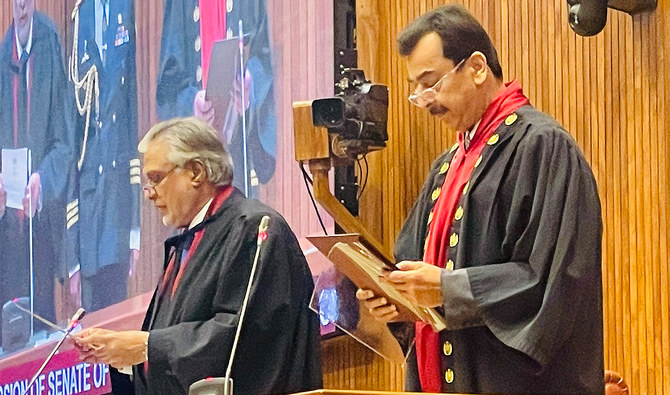ISLAMABAD: Pakistan’s ruling coalition on Tuesday secured the top posts in the Senate after its candidates, former prime minister Yousaf Raza Gillani and Syedal Khan Nasir, were elected unopposed as chairman and deputy chairman of the house, respectively.
Pakistani senators are elected for a term of six years and are responsible to discuss laws, provide their technical input and vote on legislations like other public representatives. Half of these senators retire every three years and new ones are elected to replace them.
The ruling coalition, led by the Pakistan Muslim League-Nawaz (PML-N) and Pakistan Peoples Party (PPP), joined hands to have Gillani and Nasir elected to the coveted posts on Tuesday. The PPP had nominated Gillani to be the chairman while the PML-N wanted Nasir to hold the post of the deputy chairman.
Both candidates also received support from other political parties and independent candidates.
“It is a unique honor and privilege to be elected as chairman of this august house,” Gillani told the Senate after being sworn in. “I am thankful to Allah Almighty for having been given this opportunity.”
Gillani mentioned the crises the country had been facing, saying: “Pakistan faces an assault of those who seek to divide and polarize us, those who seek to incite hatred, those who seek to replace norms of civility and abuse democracy with demagoguery.”
He said that his party had rejected politics of hate and preferred politics of “reconciliation and of the welfare of people.”
The Senate elections were held earlier this month in Pakistan’s Sindh, Punjab and Balochistan provinces and in the federal capital of Islamabad. The Election Commission of Pakistan (ECP) delayed polls on eleven Senate seats in the northwestern Khyber Pakhtunkhwa (KP) province ruled by the former prime minister Iman Khan’s loyalists last Tuesday.
Pakistan’s election regulatory body had taken the decision in response to a plea by the opposition, which had called for a postponement after nearly two dozen provincial lawmakers on reserved seats were not administered oath despite a court order.
Members of Khan’s Pakistan Tehreek-e-Insaf (PTI) party boycotted the election on Tuesday, saying the exercise was unfair since the Senate was incomplete without the presence of legislators from KP.
At the outset of the proceedings, at least 41 newly elected senators took oath as members of the House amid protests by PTI lawmakers. The ruling coalition managed to bag 19 seats, increasing its tally of total seats to 59 out of 85 in the upper house of parliament.
PTI Senator Falak Naz termed the chairman and deputy chairman Senate’s elections as “unconstitutional,” adding that his party would challenge it in the Supreme Court.
“The Senate is incomplete as our Senators are yet to be elected from Khyber Pakhtunkhwa. Therefore, this election is totally illegal and unconstitutional,” she told Arab News.
“We will protest against this undemocratic process inside and outside the parliament,” she added.
Political analysts said the Senate election had become controversial after the ECP postponed the polls on the 11 seats from KP.
“This will lead to further political instability in the country. Therefore, better sense should prevail to overcome the political challenges through a meaningful dialogue,” Munizae Jahangir, a political analyst and TV talk-show host, told Arab News.
“Our policymakers should understand that economic stability cannot be achieved without political stability in the country. So, it’s high time these political differences are resolved to focus on inflation and other issues of public importance,” she added.











